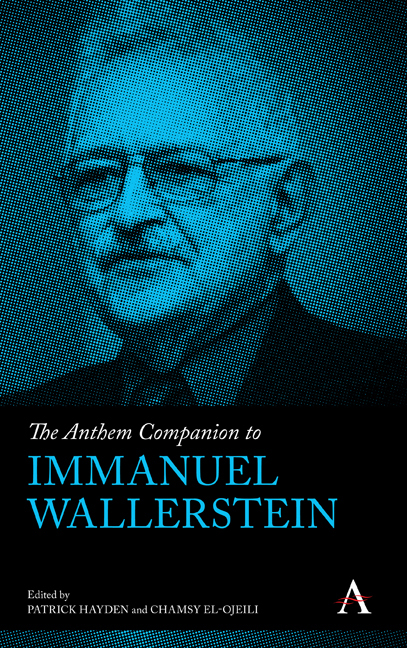Book contents
- Frontmatter
- Contents
- Notes on Contributors
- Acknowledgments
- Chapter 1 “There Is No Such Thing as Sociology”: Wallerstein as Sociologist
- Chapter 2 From Africa to the World: The Sources of Wallerstein’s The Modern World-System
- Chapter 3 Immanuel Wallerstein, World-Systems Analysis and the Structures of Knowledge
- Chapter 4 Wallerstein as International Political Sociologist: On Power, Hegemony and the Interstate System
- Chapter 5 The Agonies of Liberalism: Wallerstein on the Rise and Fall of Liberal Ideology
- Chapter 6 Global Inequalities Avant la Lettre: Theoretical Filiations and Radical Critique
- Chapter 7 Reckoning with Gender in the World-System: Insights from and Challenges to Wallerstein
- Chapter 8 The Past and Future of Antisystemic Movements: Possibilities and Limits of Social Change in Wallerstein’s World-Systems Analysis
- Chapter 9 The Global Environment and Climate Change inthe Modern World-System
- Chapter 10 Pervasive Pandemics: Understanding Global Healthand Disease from a World-Systems Perspective
- Index
Chapter 1 - “There Is No Such Thing as Sociology”: Wallerstein as Sociologist
Published online by Cambridge University Press: 29 February 2024
- Frontmatter
- Contents
- Notes on Contributors
- Acknowledgments
- Chapter 1 “There Is No Such Thing as Sociology”: Wallerstein as Sociologist
- Chapter 2 From Africa to the World: The Sources of Wallerstein’s The Modern World-System
- Chapter 3 Immanuel Wallerstein, World-Systems Analysis and the Structures of Knowledge
- Chapter 4 Wallerstein as International Political Sociologist: On Power, Hegemony and the Interstate System
- Chapter 5 The Agonies of Liberalism: Wallerstein on the Rise and Fall of Liberal Ideology
- Chapter 6 Global Inequalities Avant la Lettre: Theoretical Filiations and Radical Critique
- Chapter 7 Reckoning with Gender in the World-System: Insights from and Challenges to Wallerstein
- Chapter 8 The Past and Future of Antisystemic Movements: Possibilities and Limits of Social Change in Wallerstein’s World-Systems Analysis
- Chapter 9 The Global Environment and Climate Change inthe Modern World-System
- Chapter 10 Pervasive Pandemics: Understanding Global Healthand Disease from a World-Systems Perspective
- Index
Summary
Introduction
In a letter published in the November 1971 issue of The American Sociologist, Immanuel Wallerstein contended that, “There is no such thing as sociology if by sociology we mean a ‘discipline’ that is separate and distinct from anthropology, political science, economics, and history. […] They are all one single discipline which I suppose we may call social science.” For Wallerstein, “The ideological origins of these particular divisions lie in the philosophic frameworks of nineteenth century thought and are now antiquated” (1971, 328). These characteristically bold arguments were reiterated, reformulated and elaborated upon by Wallerstein over the next five decades and constitute an abiding theme of his game-changing version of world-systems analysis (WSA).
Wrestling with Wallerstein's positions on sociology seems important at the start of a volume that is part of a series on major sociological thinkers, because Wallerstein clearly refused to be narrowly categorized as such. In this chapter, we explore the question of what kind of sociologist Wallerstein was. As indicated, the question of sociology, and of the received intellectual division of labor in the university world, is addressed by Wallerstein in provocative fashion—he rejects the familiar divisions between nomothetic and idiographic scholarship; between past and present; between West and non-West; between state, market and civil society; between structure and agency and between the search for the good, true and beautiful. In place of such divisions, Wallerstein argues for unidisciplinarity, the singularity of knowledge, which he viewed as a really existing tendency shaped by world-systemic transformations, particularly those that followed what he called the world-revolution of 1968. From this vantage point, the prospects for sociology—once the sphere of the study of the distinctively sociocultural, and constituted by what Wallerstein viewed as the myths of societies as independent units of analysis and societal develop-ment—look decidedly dim.
On the other hand, Wallerstein's WSA was profoundly shaped by the concerns, themes, concepts and key thinkers most closely associated with the discipline of sociology—by Marx and Marxism (class, capitalism, the accumulation dynamic, contradiction, socialism), Weber (status groups, rationality, legitimation, the critique of reification), Durkheim (social groups), by confrontations with structural functionalism and modernization theory, by assumptions about the fundamental importance of hidden structures and by what Wagner (2001) views as sociology's postliberal thrust in the face of the crises of modernity.
- Type
- Chapter
- Information
- The Anthem Companion to Immanuel Wallerstein , pp. 1 - 14Publisher: Anthem PressPrint publication year: 2023



